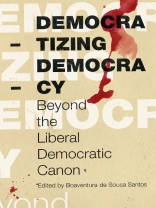The majorconflicts between the Global North and the South can be expected toresult from the confrontation of alternative conceptions of democracy, mainly between liberal or representative democracy and participatorydemocracy.
The hegemonic model of democracy, while prevailing on aglobal scale, guarantees no more than low-intensity democracy. Inrecent times, participatory democracy has exhibited a new dynamic, engaging mainly subaltern communities and social groups that fightagainst social exclusion and the suppression of citizenship.
In thiscollection of reports from the Global South-India, South Africa, Mozambique, Colombia, and Brazil-De Sousa Santos and his colleaguesshow how, in some cases, the deepening of democracy results from thedevelopment of dual forms of participatory and representativedemocracy, and points to the emergence of transnational networks ofparticipatory democracy initiatives. Such networks pave one of the waysto the reinvention of social emancipation.
This is volume 1 of the
Reinventing Social Emancipation project, edited by Boaventura de Sousa Santos.
Giới thiệu về tác giả
Emir Sader is Emeritus Professor of Political Science at the University of S�o Paolo and Director of the Latin American Social Science Research Council (CLACSO).












